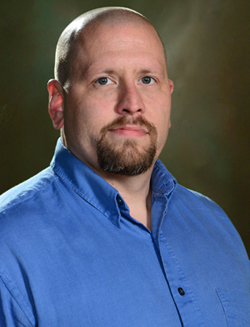
Keith Meador
Keith Meador doesn’t mind that his students say they’d rather watch videos in class than listen to him lecture.
That’s because the videos they are referring to are USC Shoah Foundation testimonies.
Meador teaches junior year American history and a senior elective on the Holocaust at Central High Magnet Career Academy in Louisville, Ky. He has taught the Holocaust for 10 of his 15 years of teaching and has participated in professional development programs at the United States Holocaust Memorial Museum, Echoes and Reflections and Facing History and Ourselves. He has used IWitness in his classes since its beta stage.
His school environment is not what you might expect for having such a strong Holocaust program, Meador noted. The student body is 89 percent African American, 10 percent ESL and refugee, and 1 percent white. The students are mostly Baptist and Muslim; there are no Jewish students.
Yet, judging from the reaction of Meador’s students to testimony in IWitness, learning about the Holocaust is a powerful experience for all of them. He starts out by showing them testimonies of survivors he’s met or those who discuss specific historical events. Later, students search on their own using keywords they can relate to, such as “hunger” or “sisters.”
Meador said the testimonies allow his students to connect with survivors as real people, and to draw lessons from the survivors’ experiences.
“As more time has passed, I appreciate the number of activities added to draw the students in and give them the power to share of themselves without taking away from the survivor’s message,” Meador said. “It helps the students understand that ‘it’ is not about them; that there are messages and struggles out there more severe than their own. But despite that, they can still hope to resist, recover and succeed.”
His students are often moved to tears and frustration, even anger, when watching testimony – because of the horrors the survivors went through and how little was done to stop these events from happening.
Meador said the question is not “Why should teachers use IWitness?” but rather “Why would you not?” Students struggle to understand humanity and often miss out on connecting personally with other people, he noted, and their families don’t always teach them the lessons they need to learn about morality and survival. Teachers can fill that role through tools like IWitness.
“All the quotes by politicians about ‘Never again’ can only mean something if we never forget,” Meador said. “This wonderful website, created through the power of the USC Shoah Foundation, helps add to our collective memory to ensure that future generations won’t miss the understanding that horrible things did happen, but we still survived.”